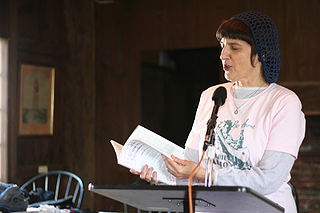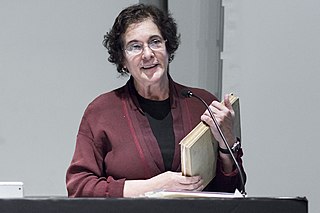Related Research Articles

Irshad Manji is a Canadian educator and the author of The Trouble with Islam Today (2004) and Allah, Liberty and Love (2011), both of which have been banned in several Muslim countries. Her latest book, Don't Label Me, was published in February 2019. Manji is a senior fellow at the Annenberg Center on Communication Leadership & Policy of the University of Southern California.

Zināʾ (زِنَاء) or zina is an Islamic legal term referring to unlawful sexual intercourse. According to traditional jurisprudence, zina can include adultery, fornication, prostitution, rape, sodomy, homosexuality incest, and bestiality. Although classification of homosexual intercourse as zina differs according to legal school, the majority apply the rules of zinā to homosexuality, mostly male homosexuality. The Quran disapproved of the promiscuity prevailing in Arabia at the time, and several verses refer to unlawful sexual intercourse, including one that prescribes the punishment of 100 lashes for fornicators. Four witnesses are required to prove the offense. Zina thus belongs to the class of hadd crimes which have Quranically specified punishments.

Islam has been practiced in Chinese society for 1,400 years. Muslims are a minority group in China, representing between 0.45% to 2.8% of the total population according to the latest estimates. Though Hui Muslims are the most numerous group, the greatest concentration of Muslims is in Xinjiang, with a significant Uyghur population. Lesser but significant populations reside in the regions of Ningxia, Gansu and Qinghai. Of China's 55 officially recognized minority peoples, ten groups are predominantly Sunni Muslim.
A combination of Islam and feminism has been advocated as "a feminist discourse and practice articulated within an Islamic paradigm" by Margot Badran in 2002. Islamic feminists ground their arguments in Islam and its teachings, seek the full equality of women and men in the personal and public sphere, and can include non-Muslims in the discourse and debate. Islamic feminism is defined by Islamic scholars as being more radical than secular feminism and as being anchored within the discourse of Islam with the Quran as its central text. As a "school of thought", it is said to refer to Moroccan sociologist "Fatema Mernissi and scholars such as Amina Wadud and Leila Ahmed".

Ayesha Jalal is a Pakistani-American historian who serves as the Mary Richardson Professor of History at Tufts University, and was the recipient of the 1998 MacArthur Foundation Fellowship.

Hauwa Ibrahim is a Nigerian human rights lawyer who won the European Parliament's Sakharov Prize in 2005.

Donna L. Halper is a Boston-based historian and radio consultant. Beginning in 1968, Halper worked as a radio disc jockey and music director, and is credited with discovering the progressive rock band Rush while at WMMS in Cleveland in 1974. She has taught courses in broadcasting, media criticism, and media history, and is author of a number of books, including the first book-length study devoted to the history of women in American broadcasting, Invisible Stars: A Social History of Women in American Broadcasting.

The experiences of Muslim women vary widely between and within different societies. At the same time, their adherence to Islam is a shared factor that affects their lives to a varying degree and gives them a common identity that may serve to bridge the wide cultural, social, and economic differences between them.
Islam is an Abrahamic religion founded in the Arabian peninsula, while Sikhism is a Dharmic religion founded in the Indian subcontinent. Islam means "submission". The word Sikh is derived from a Sanskrit word meaning 'disciple', or one who learns.
Begum Jahanara Shahnawaz was a politician and Muslim League activist. She was the daughter of Sir Muhammad Shafi. Her husband was Mian Shah Nawaz. She studied at Queen Mary College.

France Winddance Twine is an academic, documentary filmmaker and visual artist from Chicago. She is a Professor of Sociology at the University of California, Santa Barbara, where she regularly teaches courses on race, gender, inequality, girlhood, and sociology of the body.

Lila Abu-Lughod is a Palestinian-American anthropologist. She is the Joseph L. Buttenweiser Professor of Social Science in the Department of Anthropology at Columbia University in New York City. She specializes in ethnographic research in the Arab world, and her seven books cover topics including sentiment and poetry, nationalism and media, gender politics and the politics of memory.
Riffat Hassan is a Pakistani-American theologian and a leading Islamic feminist scholar of the Qur'an.
Adeline Marie Masquelier is a Professor of Anthropology at Tulane University in New Orleans, Louisiana. She received her baccalaureate in biology and physics at Centre St. Marc, in Lyon, France (1978), her B.A. in Zoology, and M.A. in Anthropology. She also received her Ph.D. from the University of Chicago in 1993 studying under the prominent Africanist and Anthropologist Jean Comaroff, and has done her field work among the people of rural Niger in the Hausa town of Dogondoutchi. Her research focuses have included spirit possession, reformist Islam, Bori religious practices, twinship, witchcraft, the pathology of consumption, medical anthropology, and gender. Currently she is the executive editor of the Journal of Religion in Africa and is researching the Izala Islamic reformist movement in Niger, examining issues including bridewealth, worship, and dress.

Islam is a minority religion in all of the countries and territories of the Americas.

Islamophobia in the United States can be described as the affective distrust and hostility towards Muslims, Islam, and those perceived as following the religion and or appear as members of the religion and its associative groups. This social aversion and bias is facilitated and perpetuated by violent and uncivilized stereotypes portrayed in various forms of American media networks and political platforms that result in the marginalization, discrimination, and exclusion of the Muslims and Muslim perceived individuals. Media and politicians capitalize on public fear and distrust of Muslims through laws that specifically target Muslims, while the media emphasizes Muslim religious extremism in association with violent activity.
Mara Ahmed is a Pakistani American filmmaker and artist based in Rochester, New York. Her production company is Neelum Films.
Anida Yoeu Ali is a Cambodian-American artist. Her works include span performance, art installation, videos, and images. Installation art is an artistic genre of three-dimensional works that often are site-specific and designed to transform the perception of a space.
Feminism in Pakistan is a set of movements aimed at defining, establishing, and defending equal political, economic, and social rights and equal opportunities for women in Pakistan. It is the pursuit of women's rights within the society of Pakistan. Like their feminist counterparts all over the world, feminists in Pakistan are supposed to seek gender equality: the right to work for equal wages, the right to equal access to health and education, and equal political rights. Feminist and women's rights consciousness in Pakistan has historically been shaped in response to national and global reconfiguration of power including colonialism, nationalism, dictatorship, democracy and the Global War on Terror. The relationship between the women's movement and the Pakistani state has undergone significant shifts, from mutual accommodation and a complementary ethos to confrontation and conflict.
Aisha Lemu was a British-born author and religious educator who converted to Islam in 1961 and lived most of her life in Nigeria.
References
- ↑ "ISAFF -- Team". ssaff.tasveer.org. Retrieved 2019-11-27.
- ↑ Examiner, The International (2005-09-15). "Tasveer pushes the edges of South Asian films in ISAFF 2005". International Examiner. Retrieved 2019-11-27.
- ↑ "Eastern Exposure: Tasveer". Seattle Magazine. 1969-12-31. Retrieved 2019-11-27.
- ↑ Knight, Michael (2009-03-25). Blue-Eyed Devil: A Road Odyssey Through Islamic America. Soft Skull Press. ISBN 978-1-59376-351-0.
- ↑ Lipsett, Barbara Diane; Trible, Phyllis (2014-01-01). Faith and Feminism: Ecumenical Essays. Presbyterian Publishing Corp. ISBN 978-0-664-23969-5.
- ↑ "Nazrah: A Muslim Woman's Perspective - Educational Media Reviews Online (EMRO)". emro.lib.buffalo.edu. Retrieved 2019-11-28.
- ↑ Haddad, Yvonne Yazbeck; Smith, Jane I.; Moore, Kathleen M. (2006-03-02). Muslim Women in America: The Challenge of Islamic Identity Today. Oxford University Press. ISBN 978-0-19-803955-6.
- ↑ "Arabic-language films and documentaries: Language Resource Center". elearning.salemstate.edu. Retrieved 2019-11-28.
- ↑ Hamann, Jennifer. "Reverting to Islam in Seattle: American Women and an Emerging Muslim Identity".Cite journal requires
|journal=(help)